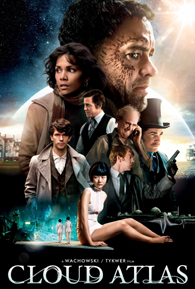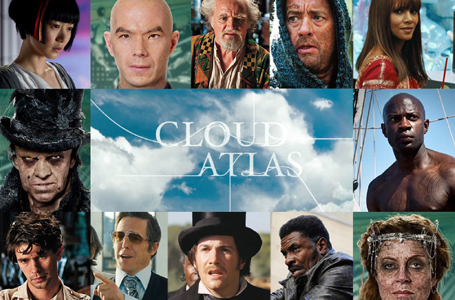
On a ship in the 1800s, a lawyer slowly poisoned to death by the ship's doctor contemplates fighting for the life of a stowaway, a runaway slave, he has harboured on the journey. At the beginning of the 1900s, a gay composer writes to his lover of his experience as a transcriber for a musical legend eager at one last shot before the grave. In the 70s, an investigative journalist pokes around a company about to launch a nuclear reactor. In the 80s, a publisher is tricked by a vengeful love rival and sent to an old folk's home. Somewhere in the next century, a mass-produced human clone will discover her individuality and lead a revolution against the world capitalist dictatorship. Yet a post-apocalyptic century or so after that, a simple shepherd is visited by an emissary of a technologically-advanced tribe...
The trick in Cloud Atlas is how the creative team of Lana (formerly Larry) and Andy Warchowski and Tom Tykwer tie all six shorts (and one epilogue) together, quite independently of the original novel. Quite unlike the efforts of Inarritu and Arriaga, the six shorts aren't bound by the simple laws of karmic rebound or the butterfly interaction between action and improbable consequence. Here all the six shorts unfold eventually from beginning to end in normal fashion, with one short cutting to another every other 5 minutes or so. The genius (or folly) of the team is to arrange the points of transition such that they all share the same point in the narrative structure or the cinematic moment: the introduction of the antagonist, the challenge to the protagonist hero, the turning point and dilemma in the end of the second act, etc. And in these moments, a few lines of dialogue repeat themselves in all six different stories.
I call this both genius and folly. And as a natural consequence, Cloud Atlas could well be both the best and worst film of the year.
Clearly to stitch together six different stories from six different genres so that they end up telling the same story and have the same moral message is something that requires vision and effort. It is genius of a sort to figure out that deep similarities underline varied narratives. You know the joke about how there are only six or seven different stories one can tell, or that there are only six or seven different variations of the same story? Academically, we give these common deep structures names like The Hero's Journey, the 3-act structure, the McKee treatment of the Hollywood screenplay and so on.
But it is a genius that smacks of folly. I'll put it this way. At the age of 13 or so, it is a matter of precocious genius or simple educational development that a teenager discovers for himself or is impressed that hey, all stories are the same. There are concrete structures underlying and guiding how stories develop. Watch enough films and you'll realise that by a certain hour, minute, and second in a film, some things are supposed to happen, and these things happen in most films at that particular time. Our 13-year-old goes through the next few years thinking everything can be boiled down to the same formula. But at age 23 or 33 or 43 or 53, our former genius will need to learn another lesson: what matters is the particularity of a story, that if you reduce everything to an even sameness, you risk reducing everything to an intellectual blandness and end up making creative works that don't matter and can't engage precisely because the structuralist approach to narratology is one that is prone to overdetermination and claims that differences don't matter, that nothing can matter, and everything is more or less the same.
And that is both the crowning achievement and Achilles heel of Cloud Atlas. In it, the Wachowskis have managed to riff off more than a handful of the most popular and engaging films and novels of all time, mash them together in an anthology film, and then proceeded to strip out what was so unique and special about them... so that in the end, an anthology inspired by all these great films ends up flattening them into a homogenised paste. The sole section which I felt had immediate impact and artistry was the story with the gay composer. No doubt the particularities of Lana Wachowski's coming out and transition process might have something to do with the unusual empathy displayed here (see link below). And In case you're curious, the films and books I'm speaking of include Amistad, Moby Dick, Amadeus, The Talented Mr Ripley, The China Syndrome, Shaft, One Flew Over the Cuckoo's Nest, Make Way for Tomorrow, Soylent Green, Blade Runner, Logan's Run, Total Recall, The Fifth Element, The Road Warrior, Zardoz, and A Canticle for Liebowitz.
The end product is staggering. You'd have to wonder at the level of genius and effort that the filmmakers put in, even though what they have achieved is something that would still be outgunned, outclassed, and out-written by the film parodies in Mad Magazine.












 Printable Version
Printable Version



















Reader's Comments
it is fascinating =)
The story, costuming and acting all came together to make it a great movie. I knew each actor/actress played several roles in the movie but I was surprised at just how many and how diverse. Well worth staying for the credits.
The timeline of the movie does jump around a bit which can make it a bit more difficult to follow. I’ve seen other movies that do this but none do it as well and creatively as Cloud Atlas.
For the first 45 minutes none of us understood what was going on really and as for Tom Hanks's Pidgeon English...really.
At no time did this hang together and with an A list cast more interested in their own performances than the plot l can only recommend you do not waste your time or money.
Please log in to use this feature.